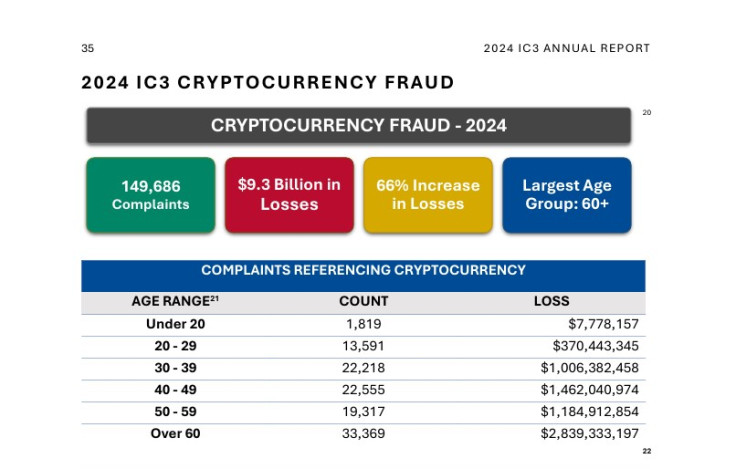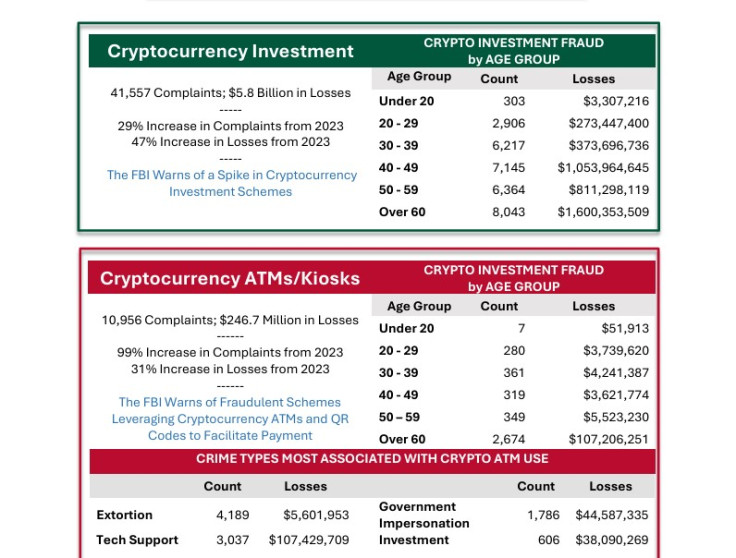
KEY POINTS
- Of $9.3 billion lost to crypto scams last year, elderly Americans saw over $2.8 billion in losses
- In contrast, Americans aged under 20 lost some $7 million to crypto scams last year
- The FTC previously said elderly consumers were three times more likely to get scammed
Billions were lost to cryptocurrency scams in 2024, and elderly Americans were the group that suffered the largest losses, the Federal Bureau of Investigation's Internet Crime Complaint Center (IC3) said in its 2024 fraud report published Wednesday.
In its Fraud Report 2024, the IC3 said there were a total of 149,686 complaints to the center throughout the year that were related to crypto, and nearly the total losses in crypto reached nearly $10 billion.
Crypto Scammers Target Elderly Americans
According to the report, there were more than 1,800 complaints related to crypto among Americans aged under 20. Losses incurred were $7 million in the said age group. They were the less targeted demographic.
In contrast, U.S. residents aged over 60 suffered over $2.8 billion in losses to scams related to crypto. Next in line are Americans aged between 40 and 49 years, with losses exceeding $1.4 billion.

The past year's losses represented a 66% spike in losses referenced to crypto fraud and scams compared to 2023.
In terms of fraud trends in the past year, elderly Americans were also the ones who suffered the biggest losses over crypto investment scams. Of $5.8 billion lost to the said fraudulent activities, people aged over 60 lost $1.6 billion.
The same trend was observed in fraudulent crypto ATMs and kiosks, wherein elderly people accounted for over $107 million in losses of the total $246.7 million wiped out.
Tech-support related scams and frauds made up a disproportionate chunk of the complaints, further highlighting how threat actors take advantage of the elderly people who may not be well-versed in technological processes.

The FBI's report corroborates a mid-2024 report by the Federal Trade Commission (FTC) wherein it was found that elderly consumers were more than three times as likely as younger adults to be scammed by Bitcoin ATMs.
Threat Actors Targeting Elderly Create Tough Situations to Dupe Consumers
As per the FTC, most scammers that utilize Bitcoin ATM frauds create difficult situations for people they target, especially the elderly who are more likely to get worried about their assets.
For instance, the threat actors contact a victim, claiming to be customer service representatives flagging a supposed identity theft or a security breach on the victim's accounts, triggering fear that will make the victim take action amid confusion.
"They're trying to create a situation that is really hard to ignore. From there, people are convinced that the problem is actually extremely serious," said Emma Fletcher, a senior data researcher at the FTC.
Despite efforts across the broader crypto industry to provide secure channels for transactions, it appears scammers and fraudsters are still a step ahead, requiring more work from the sector that's long been the subject of security concerns.







